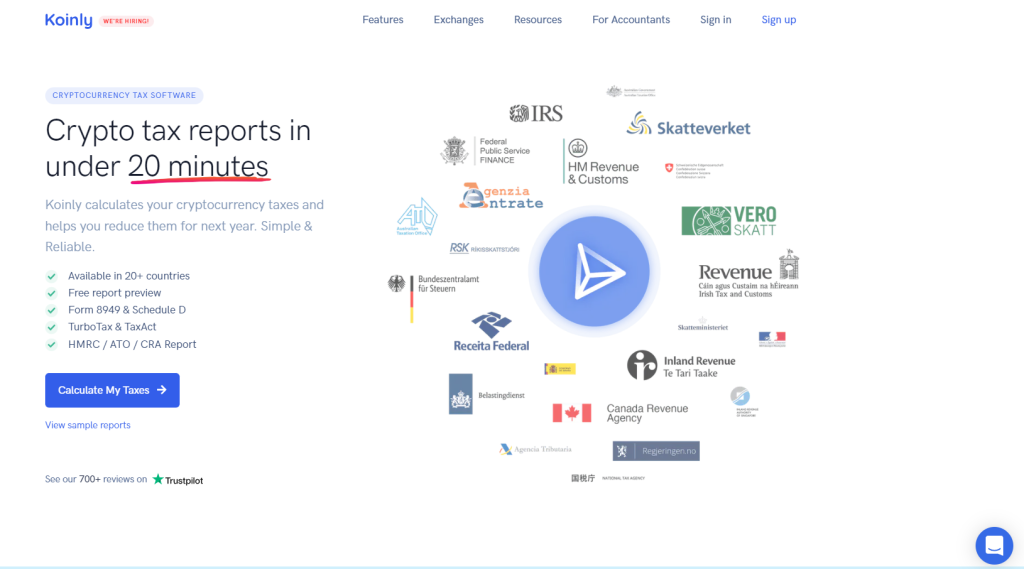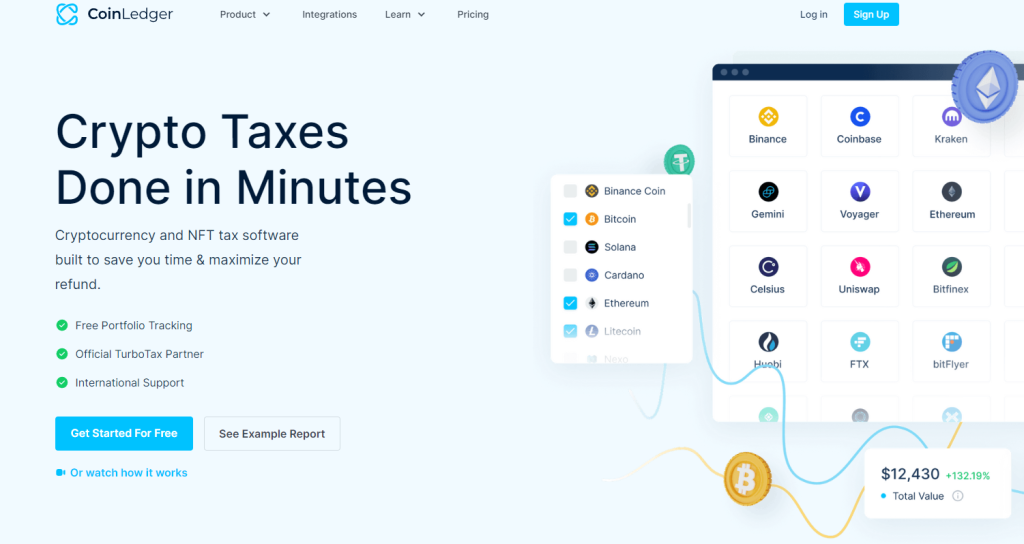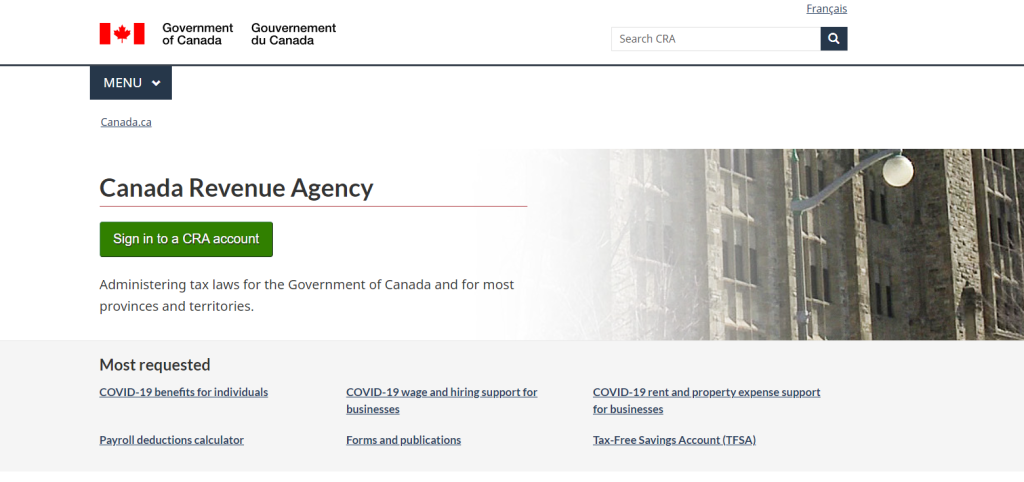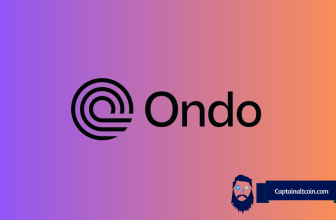
What you'll learn 👉
Best Crypto Tax Software Calculators in Canada
There are several options for crypto tax software in Canada, each with its own features and benefits, making it difficult to select the ideal one. After careful consideration, we have narrowed the field down to the four best choices:
Koinly

Koinly is regarded as a top crypto tax filing app. Your transaction history is automatically synced, and data may be imported from more than 400 crypto exchanges and more than 100 crypto wallets.
Its special tax report templates are made specifically for Canadian taxpayers and include information about your income and allowable deductions. For filing needs, it even creates a complete PDF file.
The platform offers a free price plan with a cap of 10,000 transactions, but depending on how many transactions it offers, annual subscriptions can range from $49 and $279.
Zenledger
When it comes to crypto tax software, ZenLedger is a popular choice. Its goal is to facilitate the management of crypto transactions and the filing of relevant tax documentation.
It is easy to follow the process. Check the information, download the form, and import your transaction history are all that are required. It supports over 30 distinct De-Fi protocols and over 400 exchanges and wallets.
ZenLedger’s exceptional customer support to its clients is another notable feature. Its experts are available through phone, chat, and email seven days a week.
The platform has a free price plan with a monthly transaction cap of 25. A one-year subscription costs between $49 and $999, with the price difference according to the number of transactions made available for the subscribers.
Coinledger
CoinLedger may be used for global tax reporting in any country that supports FIFO, HIFO, or LIFO accounting. This includes Canada.

With its user-friendly interface, this crypto tax software has attracted over 300,000 users. They support various crypto wallets, exchanges, NFTs, and other services, and they work with over 10,000 distinct cryptos.
Because it syncs with your preferred platforms, it can effortlessly import your prior transactions. You can easily input your transactions and calculate your taxes whether you trade, earn interest, or purchase NFTs.
There is no accessible free pricing plan. Depending on how many transactions it enables, an annual subscription might cost anywhere between $49 and $299.
TokenTax
A tax filing business called TokenTax provides tax-filing services for 18 nations, including Canada. The firm, which was founded in 2017, provides full-service filing as well as a stand-alone program that computes taxes for crypto transactions. With TokenTax, users can easily create IRS Form 8949 for digital assets. Additionally, customers can have TokenTax file their return on their behalf.
TokenTax offers support for each and every crypto exchange and tax jurisdiction on the planet. While integrations with the more well-known crypto exchanges are smoother than those with smaller exchanges, the truth is that any exchange that allows trade data to be exported through a CSV file may have transaction data imported into it.
There is no accessible free pricing plan. Depending on how many transactions it enables, an annual subscription might cost anywhere between $65 and $3,499.
How do crypto taxes work in Canada?
It might be challenging for a newcomer to know what documentation is necessary and how to correctly apply taxes when first starting out with crypto. The Canada Revenue Agency (CRA) taxes crypto holdings similarly to other commodities, therefore, Canadians must report crypto profits.

When it comes time to pay your taxes, any earnings you make from trading or investing in cryptos will be treated as either business income or capital gains. Regarding taxes, half of your capital gains will be subject to taxes.
For example, you bought any crypto for $20,000. By the end of the year, the price of your crypto, which you bought, increased to $50,000. You would pay a capital gains tax of 50% of your profit which was $30,000, e.i. 15,000$ would be taxable.
The personal amount is a standard, non-refundable income tax benefit available to all filers. The standard deduction for a single taxpayer in 2022 is $14,398. However, this amount is subject to change yearly to account for inflation and other variables. The CRA has officially approved a hike to $15000 for the upcoming fiscal year (2023). Additionally, a personal cap for provincial or territorial taxes was established by each province and territory.
In Canada, you’ll pay a Federal Tax Rate and a Provincial Tax Rate. A similar framework is used for the provincial income tax rates as is used for the federal rate. Due to Canada’s graduated income tax structure, not all of your taxable income will be taxed at the same rate. Below is a table displaying the various rates of Federal Income Tax rates:
| Tax Rate | Income (2022) |
| 15% | up to $50,197 |
| 20.5% | $50,197 – $100,392 |
| 26% | $100,392 – $155,625 |
| 29% | $155,625 – $221,708 |
| 33% | $221,708+ |
Which crypto transactions are taxable?
It’s possible to make a profit or lose money on the sale of your crypto, depending on how much its value has changed since you bought it. Disposal events include:
- if you sell crypto for fiat currency
- if you swap one crypto for another crypto
- if you spend crypto to buy things
- if you gifting crypto
When you have income, such as when you earn crypto, you are liable to income tax. The following situations, but not all, can be viewed as income in Canada:
- if someone pays you in crypto
- if you mine crypto, unless at a hobby level
- if you staking in crypto
- if you receiving crypto dividends
- if you sold NFT that you created
You will be taxed at the same rate on crypto earnings as you would be on any other income you receive. You will be subject to both federal and provincial income tax rates.
Selling your crypto assets for Fiat
To avoid disclosing their crypto holdings to the CRA, most people opt to make a one-time investment and then store their coins for years. You must declare the sale on your next tax return regardless of whether you made a profit or a loss. If you’ve earned a profit, you must pay capital gains tax or record it as business income. However, you can also write off the losses to reduce the tax you must pay.
Swapping one crypto asset for another
Even if you buy a coin at ICO using crypto, exchanging BTC for altcoins is still considered a disposition. The finest exchanges simplify this procedure, but they don’t always make it apparent that the deal is taxed.
Using crypto to pay for any goods or services
Buying products and services is the same as engaging in a “barter transaction,” which is when you and another party come to an agreement to exchange things or services without using money. The recipient will treat the crypto as a business expense, and the sender may owe taxes on capital gains if they’ve earned a profit while buying it.
Giving away crypto as a gift
If someone gives you crypto as a gift, you won’t be responsible for paying any taxes on it, but the giver could be. Gifting crypto that has appreciated in value between the time bought it and the time of transfer is considered a capital gain. As with any purchase, if the asset loses value before you send it, you will incur a capital loss.
Is it business income or capital gain?
To determine whether you have business income or capital gains, the CRA said they would look at each individual instance. Furthermore, they say that while one transaction can be considered business revenue, another one by the same investor might be regarded as a capital gain. As say CRA, the following signs indicate that you may have business income:
- demonstrating your intention to earn
- crypto activity for commercial reasons
- crypto activities that are regular or repetitive
- promotes a product or service
If you actively engage in crypto trading and generate a profit, it is more likely that the funds you withdraw will be treated as business income rather than capital gains.
How are NFTs taxed in Canada?
Although the CRA has not provided any explicit tax guidance on NFTs, it is reasonable to assume that, like other cryptos, they are digital assets and are thus treated as capital property under Canadian law. This means NFTs will be subject to the same tax rules as other crypto assets. The NFT’s tax status will be affected by how you use them. The minting or buying of an NFT itself is not a taxable occurrence.
Business revenue from the creation and sale of an NFT is liable to Income Tax for the same reasons that income from the sale of any other product is. Along these lines, it’s probable that farming NFTs for a staking reward will be counted as revenue in the same way that DeFi staking rewards are.
Those who aren’t considered traders must pay Capital Gains Tax in the following situations:
- Gifting an NFT
- Swapping one NFT for another NFT
- Selling an NFT for crypto or fiat
- Buying an NFT with crypto
How are airdrops and forks taxed in Canada?

Tokens and coins obtained through airdrops and hard forks are not expected to be taxable as income at the time of acquisition but may be subject to Capital Gains Tax if and when they are sold. If you are dealing as an individual and not a corporation, the CRA is unlikely to see airdrops and hard forks as a source of income.
When you spend, trade, give, or sell any crypto you acquire through an airdrop or a hard fork, it will be handled similarly to any other crypto. When you dispose of your crypto, you will incur Capital Gain Tax. Due to the CRA’s reliance on the adjusted cost basis technique, all of the money you make from the sale will be considered profit and subject to Capital Gains Tax.
Crypto staking tax
CRA considers any PoS gains to be subject to income tax, as you are essentially “earning” the crypto through the staking process. If you sell, exchange, spend, or give away the staked tokens you’ve accumulated, you’ll have to pay Capital Gains Tax.
Crypto mining tax Canada
When disposing of crypto mining as a hobbyist, you will only be subject to Capital Gains Tax. If your mining profits are more like a business’s, you will be subject to Income Tax.
DeFi taxes Canada
How the CRA treats your DeFi assets depends on whether it considers you an individual investor or treats your crypto investments like company revenue. In each individual instance, they make a determination. Profits from “individual trading” are subject to Capital Gains Tax. If your DeFi transactions are frequent, systematic, for-profit, or business-related, you will be subject to Income Tax on the whole amount of your investment gain.
Cryptocurrency tax breaks in Canada
Canada offers a few tax breaks. Those are:
- half of your capital gains will be exempt from Capital Gain Tax,
- the first $14,398 of your income for the 2022 tax year is exempt from taxation,
- you can transfer your unused personal tax allowance to your spouse or common-law partner if you are married or in a common-law relationship.
Can the CRA track crypto?
Your crypto holdings are not anonymous to the CRA. They’ve declared their intention to share client data with crypto exchanges. They’re keeping tabs on Canadian crypto investors in this way to make sure they’re properly declaring their holdings and paying their portion of crypto taxes.
Whenever a transaction occurs in Canada that exceeds $10,000, the money service provider is required to report it to the Canada Revenue Agency. Thus, the CRA will be informed if you transfer $10,000 to a crypto exchange.
How to file crypto taxes on TurboTax Canada?
👉 To file crypto taxes on TurboTax Canada, follow the steps in the text below:
- First, if you don’t have an account on the TurboTax platform, create one. Sign in to your TurboTax account.
- On the left side, find the “Investments” section, and expand it by clicking the downside arrow icon.
- Choose the “Capital Gains and Capital Gains Deduction Profile” option by clicking on it.
- On the “Capital Gains Information” window, click on the “Continue” button.
- In the “Type of capital property disposed of” drop-down menu, select the “Bonds/other properties” option.
- In the fields “Proceeds of disposition”, “Adjusted cost base”, “Outlays and expense”, and “Eligible amount of gift”, put the values from section 3 of your Schedule3 document and click the “Done” button.
- On the “Capital Gains Summary” window, click the “Done” button, then you will see how much is your taxable capital gains, and click on the “Continue” button.
👉 If you have losses from previous years, follow these steps:
- Click on the “Find” option in the right-top corner, type “lose” in the searching field, choose the “Losses” option and click “Go”.
- On the “Your Losses Profile” window, check the “Net Capital Loss Carry Forward” option and click the “Continue” button.
- Put needed information in appropriate fields and click the “Continue” button, and then click the “Done” button.
👉 If you have crypto income, follow these steps:
- Click on the “Find” option in the right-top corner, type “income” in the searching field, scroll down and choose the “Investments” option and click “Go”.
- On the “Your Investments Profile” window, if you are a crypto investor who holds crypto assets only and does nothing else, check the “Capital Gains or Losses (shares, properties, etc.)” option. But if you have any income from crypto like(DeFi interest, Staking rewards, paid in crypto, or sold NFTs), check the “Interest and Other Investments Income” option, and click the “Continue” button.
- On the window “Interest and Other Investment Income”, enter the amount of your income in the “Amount” field, and give it name in the “Specify” field. Then click the “Done With Interest and Other Investment Income” button. That’s it.
FAQs
Schedule 3 on your personal income tax return is where you record any capital gains or losses.
Yes, Koinly works in Canada. It supports over 300 exchanges, including Canadian exchanges like NDAX, Coinberry, Shakepay, and Bitbuy.
Unfortunately, there is no method to legally avoid paying taxes in Canada on cryptos. Individuals are legally required to declare profits on trades below $10,000 in their yearly tax return, while exchanges are required to immediately report any transactions over $10,000 to the CRA.
Your crypto investments can be tracked by the Canada Revenue Agency. All Canadian money service companies must inform the CRA of transactions worth more than $10,000 starting on January 1, 2022. Therefore, if you pay $10,000 to a crypto exchange, the CRA will be informed of it.
Yes, TurboTax does crypto. Crypto taxes may be easily imported into TurboTax Online and understood, just like taxes on other assets, whether you invest in cryptos through Coinbase, Robinhood, or other exchanges.
Yes, you have to report crypto on taxes in Canada. You only record profits or losses on capital assets in the tax year in which you sell them, as is the case with other forms of capital investments. whenever you sell or exchange your assets. Therefore, purchasing and holding cryptos is not a taxable event.
For now, Coinbase doesn’t offer tax forms to users outside of the United States.






